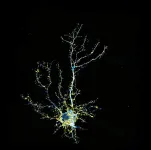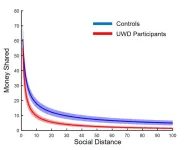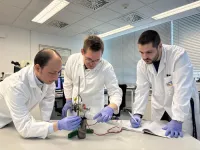(Press-News.org) EMBARGOED UNTIL 15.00 US ET (20.00 BST) ON MONDAY 14 APRIL 2025
The study lead by Professor Dan Lawrence, of Durham University in the UK, found that across ten millennia, more unequal distributions of wealth correlated with longer-term human settlement.
However, the team are keen to stress that one factor is not causally dependent on the other, giving hope that humankind’s survival is not linked to ever increasing inequality.
The research is part of a Special Feature of the Proceedings of the National Academy of Sciences (PNAS), entitled Global Dynamics of Wealth Inequality.
Sustainability is defined by the UN as ‘meeting the needs of the present without compromising the ability of future generations to meet their own needs’. The study investigated the relationship the two key aspects of this definition, continuity and equality.
The team used data on house size from across the world, covering the last 10,000 years, analysing records of over 47,500 homes across over 2,990 archaeological sites.
Differences in house size were used as a measure of inequality during different time periods. This data was then analysed alongside information on the duration of occupation, in simple terms how long people lived in a settlement before it was abandoned.
The findings revealed a correlation between the two measures – with more unequal settlements (as measured through house sizes) tending to persist for longer. However, this relationship was not found to be causal, and instead both factors rose with the increased scale and complexity of human systems.
The research team believe the findings could help inform interventions to improve future sustainability.
Speaking about the research, Professor Dan Lawrence, Department of Archaeology at Durham University said: “The UN definition of sustainability references our societies not only continuing to exist but becoming more equal.
“We wanted to understand the relationship between those two aspects and ask whether equality or inequality is historically more sustainable.
“What we found is that, as humankind’s systems become larger and more complex, inequality has tended to increase alongside longer persistence. But the two are not mutually dependant, showing that humankind might be able to achieve sustainable persistence without the need for increased inequality.
“It is not the case that inequality is simply a necessary by-product of building complex, sustainable societies.
“We need to be aware of, and attentive to the historical interplay between inequality and sustainability.
“At a time of ever-increasing wealth inequality and sustainability challenges including climate change, the lessons from the past 10,000 years could be invaluable for helping us to achieve a more equal, truly sustainable future.”
The study was authored by researchers from across Europe and the USA, drawing on a database collected by archaeologists from across the world. It is published as part of a special feature of PNAS, which has examined the origins and drivers of inequality from multiple angles.
Each of the studies has utilised a specially compiled data set on house sizes across the world from the last 10,000 years, as well as information on societies across time, such as structures, hierarchies, agriculture etc.
Professor Dan Lawrence, Department of Archaeology, Durham, has also been co-author on eight other papers as part of this special feature.
ENDS
END
Archaeologists discover historical link between inequality and sustainability
2025-04-14
ELSE PRESS RELEASES FROM THIS DATE:
Researchers develop an LSD analogue with potential for treating schizophrenia
2025-04-14
University of California, Davis researchers have developed a new, neuroplasticity-promoting drug closely related to LSD that harnesses the psychedelic’s therapeutic power with reduced hallucinogenic potential.
The research, published in Proceedings of the National Academy of Sciences, highlights the new drug’s potential as a treatment option for conditions like schizophrenia, where psychedelics are not prescribed for safety reasons. The compound also may be useful for treating other neuropsychiatric ...
How does our brain regulate generosity?
2025-04-14
Are there areas of the brain, which regulate prosocial, altruistic behaviour? Together with colleagues from the universities in Lausanne, Utrecht and Cape Town, researchers from Heinrich Heine University Düsseldorf (HHU) have studied a very special group of patients and established that the “basolateral amygdala” (part of the limbic system) plays an important role in this. In the scientific journal Proceedings of the National Academy of Sciences (PNAS), they describe that this region calibrates social behaviour.
Prosocial ...
New study reveals wealth inequality’s deep roots in human prehistory
2025-04-14
PULLMAN, Wash. — Wealth inequality began shaping human societies more than 10,000 years ago, long before the rise of ancient empires or the invention of writing.
That’s according to a new study led by Washington State University archaeologist Tim Kohler that challenges traditional views that disparities in wealth emerged suddenly with large civilizations like Egypt or Mesopotamia. The research is part of a special issue of the Proceedings of the National Academy of Sciences, co-edited by Kohler and Amy Bogaard, an archaeologist at Oxford University in England.
Drawing on data from over 47,000 residential ...
New archaeological database reveals links between housing and inequality in ancient world
2025-04-14
If the archaeological record has been correctly interpreted, stone alignments in Tanzania’s Olduvai Gorge are remnants of shelters built 1.7 million years ago by Homo habilis, an extinct species representing one of the earliest branches of humanity’s family tree.
Archaeological evidence that is unambiguously housing dates to more than 20,000 years ago—a time when large swaths of North America, Europe and Asia were covered in ice and humans had only recently begun living in settlements.
Between that time and the dawn of industrialization, the archaeological record is rich not only with evidence of settled life represented by housing, but also with evidence ...
New, non-toxic synthesis method for “miracle material” MXene
2025-04-14
It is one of the most significant trends in materials science: materials that consist of only a single layer of atoms, so-called “2D materials”, often show completely different properties than thicker layers consisting of the same atoms. This field of research began with the Nobel Prize-winning material graphene. Now, research is being conducted into the material class of MXenes (pronounced Maxenes), which consist mainly of titanium and carbon, by TU Wien (Vienna) together with the companies CEST and AC2T.
These MXenes have properties that ...
Cutting-edge optical genome mapping technology shows promise for diagnosis, prognosis, and therapeutic options of multiple myeloma
2025-04-14
Philadelphia, April 14, 2025 – Researchers have demonstrated the potential of the innovative optical genome mapping (OGM) technique for the diagnosis, prognosis, and therapeutic management of multiple myeloma. This new study in The Journal of Molecular Diagnostics, published by Elsevier, details how this novel method can establish the cytogenomic profile of the tumor on a scale suitable for routine practice in cytogenetics laboratories.
Multiple myeloma, a type of blood cancer that forms in plasma cells (a type of white blood cells), is the second ...
Study looks at impact of COVID-19 pandemic on rates of congenital heart disease procedures among children
2025-04-14
Major reallocation of healthcare services during the COVID-19 pandemic meant that elective surgery in children with congenital heart disease (CHD) was significantly reduced, so that those needing urgent, lifesaving and emergency surgery could be treated. However, this prioritisation of the most severely ill children did not increase overall post-operative complications rates or death, a study led by the University of Bristol has shown.
The research, published in Open Heart, suggests that prioritising surgery for younger and more critically ill children may be appropriate when there is a sudden disruption of usual care. The ...
UH researcher unveils new model to evaluate impact of extreme events and natural hazards
2025-04-14
When you’re on a sandy beach or the banks of a river, transformed by rolling waves or slightly still waters, it’s likely you’re not thinking about what happens just beneath the surface, where dirt and pollution are swirling and traveling through to new destinations.
But Hanadi Rifai does. The Moores Professor of Civil and Environmental Engineering and director of the Hurricane Resilience Research Institute, has spent two decades examining Galveston Bay – its tides, currents ...
Illegal poisonings imperil European raptors and could disrupt ecosystem health
2025-04-14
A recent comprehensive assessment on the poisoning of raptors across Europe does not yield good news. This is according to the new paper “Poisoning in Europe Between 1996 and 2016: A Continental Assessment of the Most Affected Species and the Most Used Poisons,” published in the Journal of Raptor Research. A large team of raptor researchers amassed retrospective data on poisoning events across 22 European countries between 1996 and 2016. Carbofuran and aldicarb were the most common toxins reported and disproportionately affected scavenging raptors, especially in Northern ...
UF professor develops AI tool to better assess Parkinson’s disease, other movement disorders
2025-04-14
A University of Florida researcher has developed a groundbreaking open-source computer program that uses artificial intelligence to analyze videos of patients with Parkinson's disease and other movement disorders. The tool, called VisionMD, helps doctors more accurately monitor subtle motor changes, improving patient care and advancing clinical research.
Diego Guarin, Ph.D., an assistant professor of applied physiology and kinesiology in UF’s College of Health and Human Performance, created the software to address the potential risk of inconsistency ...




